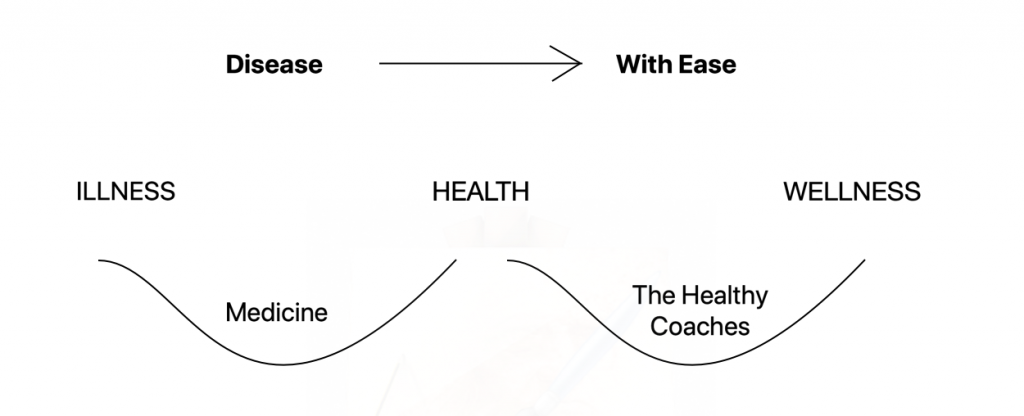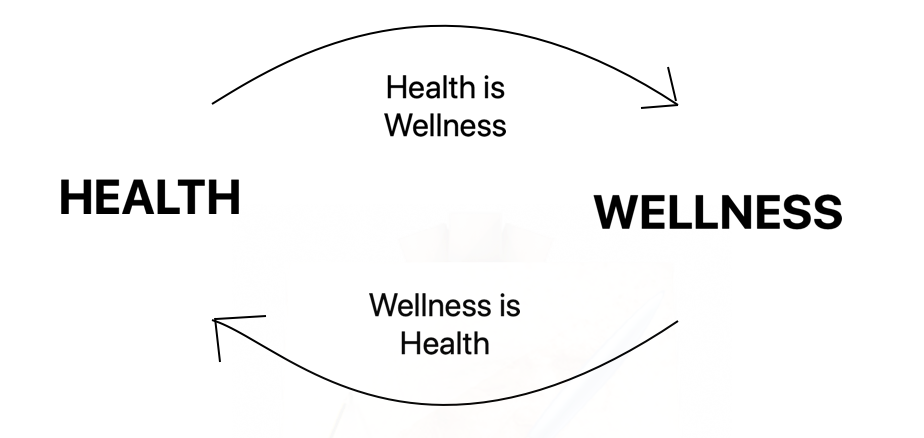This is part 2 of our series where we try and define the words “health”, “wellness” and well-being”. Here will will take a look at “What is Wellness”.
1. In our last podcast we tried to answer the question “What is health?” and in trying to define it we looked at medical definitions, dictionary definitions, etymology and the World Health Organization (WHO) definition. We then used the WHO definition to create a model for health that spanned the complete spectrum from the absence of disease all the way to complete physical, emotional, and social health.
In trying to understand that model and explain it to others I’ve found that having one word to describe the entire spectrum is too confusing and therefore we need to assign clearer definitions to these words.
In light of this we’re going to revert back to the Oxford dictionary definition of health which is defined as ‘the state of being free from illness and injury’. This definition is very clear and concise. It also works with our illness/health/wellness model where we have illness on one end and wellness on the other with health in the middle.

2. Going back to the WHO definition; they describe health as “a state of complete physical, mental and social well-being and not merely the absence of disease or infirmity”. This statement has 2 definitions in my opinion, one for health, and one for wellness. Therefore I think this statement can be broken up into these 2 statements:
(i) Health is the absence of disease or infirmity.
(ii) Wellness or is complete physical, mental and social well-being.
This is much clearer than having everything described as “health” but we are still left with a sentence that requires defining – “Wellness is complete physical, mental and social well-being”.
That’s what we’re going to try and discuss today.
3. Wellness Etymology
Wellness is a relatively new word which is one reason why it’s difficult to define. There is very little information on the topic. One of the best resources I came across was “The History of Wellness” from the Global Wellness Institute – https://globalwellnessinstitute.org/industry-research/history-of-wellness/.
According to this website, the first account of the word wellness dates back to the 1650’s. Here’s what they say:
1650s: The use of the word “wellness” in the English language – meaning the opposite of “illness” or the “state of being well or in good health” – dates to the 1650s, according to the Oxford English Dictionary. The earliest published reference is from the 1654 diary entry of Sir Archibald Johnston: “I … blessed God … for my daughter’s wealnesse.” The first citation with modern spelling is from a 1655 letter from Dorothy Osborne to her husband, Sir William Temple: “You … never send me any of the new phrases of the town… Pray what is meant by wellness and unwellness?”
On the Oxford English Dictionary website there are some references of the word “well-being” been used from the 17th century onward in the context of “the state of being or doing well in life; happy, healthy, or prosperous condition; moral or physical welfare (of a person or community)”:
Link – https://www.oed.com/oed2/00282689;jsessionid=6C04BC77AD21CC7D7034E3096CDC0AD4
1900s: John Harvey Kellogg (director of the Battle Creek, Michigan Sanitorium and creator of Kellogs corn flakes) espouses a healthy diet, exercise, fresh air, hydotherapy and “learning to stay well.”
Sidenote – 1910: The Carnegie Foundation’s Flexner Report, a critique of North America’s medical education system for lack of standards and scientific rigor, questions the validity of all forms of medicine other than biomedicine, resulting in most alternative systems (homeopathy, naturopathy, etc.) being dropped from mainstream medical education, and setting the stage for our modern disease-oriented, evidence-based medicine.
20th Century: Our modern use of the word “wellness” dates to the 1950s and a seminal – but little known – work by physician Halbert L. Dunn, called High-Level Wellness (published1961).
Dunn is known as the “father” of the wellness movement. He distinguished between good health – not being ill – and what he termed high-level wellness, which he defined as “a condition of change in which the individual moves forward, climbing toward a higher potential of functioning“.
Although Dunn’s work received little attention initially, his ideas were later embraced in the 1970s by an informal network of individuals in the U.S., including Dr. John Travis, Don Ardell, Dr. Bill Hettler, and others. These “fathers of the wellness movement” created their own comprehensive models of wellness, developed new wellness assessment tools, and wrote and spoke actively on the concept. Travis, Ardell, Hettler and their associates were responsible for creating the world’s first wellness center, developing the first university campus wellness center, and establishing the National Wellness Institute and National Wellness Conference in the U.S.
– That’s all I could find on etymology!
4. Dictionary Definitions of Wellness
– Dictionary.com:
noun
1. the quality or state of being healthy in body and mind, especially as the result of deliberate effort.
2. an approach to healthcare that emphasizes preventing illness and prolonging life, as opposed to emphasizing treating diseases.
– Merriam-Webster: https://www.merriam-webster.com/dictionary/wellness:
The quality or state of being in good health especially as an actively sought goal.
– Oxford English Dictionary:
The state of being in good health, especially as an actively pursued goal.
With these definitions we are running into some of the same issues we did while trying to define the word “health”. Health is often defined as being well, as wellness, or a state of well-being. Wellness too falls into this trap in that it is being defined as “good health”, or “healthy” in mind and spirit.
This is called a circular definition, which is an explanation of a term that relies on references to the term itself or a close synonym: 
The term lexicographic (lexicon is a dictionary or the vocabulary of a language) circular definitions is what’s used to refer to words that are defined in terms of their synonyms. That’s exactly what we have here. “Health” is often defined in terms of its synonym – “well”, wellness”, “well-being” and these same works with the root “well” are defined with some variation of the synonym “health”.
That’s why we often find these terms referred to synonymously in modern conversation. “Health and wellness” is a phrase that we all use, without actually understanding the definitions of the words. That’s no surprise when the words themselves are defined circularly.
How we define our language is how we shape our reality. Therefore if we wish to be both “healthy” and “well”, we need clearer, more precise definitions of these all important words.
5. “Wellness” Summary
(i) “Wellness” is a very new word. There are some vague references to it being used from the 1650’s onwards, however mainstream use of the word only came to the fore from the 1950’s onwards.
(ii) Physician Halbert L. Dunn is considered the father of the wellness movement. In his book High-Level Wellness (published1961) he termed high-level wellness, which he defined as “a condition of change in which the individual moves forward, climbing toward a higher potential of functioning”.
(iii) One common distinction between “health” and “wellness” that we find in modern definitions is that health is passive (medical model) and wellness is active (deliberate practice). Examples include:
– Dictionary.com: The quality or state of being healthy in body and mind, especially as the result of deliberate effort.
– Oxford English Dictionary: The state of being in good health, especially as an actively pursued goal.
(iv) Lexicographic circular definitions is the term that’s used to refer to words that are defined in their synonyms. That’s the problem we find with definitions of the words “health” and “wellness”. Health is defined as being well and wellness is defined as being healthy. This is true not only for dictionary definitions but also for mainstream authorities such as the WHO who define health as “complete physical, mental and social well-being”.
(v) How we define our language is how we shape our reality. Therefore if we wish to be both “healthy” and “well”, we need clearer, more precise definitions of these all important words.
